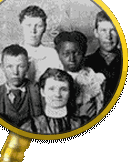What to Know
Teaching Time
2 50-minute class periods and homework
Grade Level
High School
Disciplines
- Reading, Writing, Speaking and Listening
- Geography
- History
- Science and Technology
Historical Period
- Expansion and Reform - 1801-1855
Telling and documenting the story and discoveries of the Lewis and Clark expedition was in some ways the most complex part of the venture. Jefferson hoped the journals kept on the expedition would serve as the backbone of a comprehensive publication that would enlighten the world on the scientific, geographical, ethnological, and political accomplishments of the trip. He gave specific instructions for documenting all aspects of the trip. It was hoped that Lewis would visit Philadelphia after he returned to consult with his mentors who would assist him in completing the manuscript for publication. Unfortunately Lewis committed suicide in October 1809 leaving many questions unanswered. It was not until 1814 that the official publication of the expedition abbreviated and incomplete was issued. Multiple "unauthorized" versions appeared over the years. Jefferson and the scientific community were not the only parties interested in learning about the expedition. The American people themselves hungered for information about what the Corps of Discovery saw and encountered. Even today we are curious and excited about the journey and the exploits of Lewis and Clark. In this lesson students ask Meriwether Lewis questions about the specific goals of the expedition in an exclusive interview granted by the explorer. Subjects to be covered, specified in advance by Lewis, are paleontology, geography, cartography, ethnology, and science. Students will pose five questions and then, using the journals of the expedition, prepare Lewis's response.
Objectives
Students will: 1. Formulate five provocative questions to ask Meriwether Lewis in an exclusive interview after his return from the expedition in the areas of paleontology, geography, cartography, ethnography, and science. 2. Using the journals of the expedition students will prepare meaningful responses to the questions as they believe Meriwether Lewis would have answered them and submit their question and answer in writing. 3. Cite the journal entries used in writing their question response. 4. Present their question and answer to the class.
Students will: 1. Formulate five provocative questions to ask Meriwether Lewis in an exclusive interview after his return from the expedition in the areas of paleontology, geography, cartography, ethnography, and science. 2. Using the journals of the expedition students will prepare meaningful responses to the questions as they believe Meriwether Lewis would have answered them and submit their question and answer in writing. 3. Cite the journal entries used in writing their question response. 4. Present their question and answer to the class.
Standards Alignment
-
Geography
7.1.9. A. Explain geographic tools and their uses.
7.3.9. B. Explain the human characteristics of places and regions by their cultural characteristics.
-
History
8.1.9. B. Analyze and interpret historical sources.
8.1.9. D. Analyze and interpret historical research using primary sources.
-
Reading, Writing, Speaking, and Listening
1.1.11. D. Identify, describe, evaluate and synthesize the essential ideas in text.
1.1.11 G. Demonstrate after reading understanding and interpretation of both fiction and nonfiction text, including public documents.
1.5.11. B. Write using well-developed content appropriate for the topic.
1.5.11. G. Present and/or defend written work for publication when appropriate.
1.6.11. A. Listen to others.
1.6.11. D. Contribute to discussions.
1.6.11. E. Participate in small and large group discussions and presentations.
1.8.11. B. Locate information using appropriate sources and strategies.
-
Science and Technology
3.2.10. A. Apply knowledge and understanding about the nature of scientific and technological knowledge.
3.2.10. B. Apply process knowledge and organize scientific and technological phenomena in varied ways.
3.5.10. A. Relate earth features and processes that change the earth.
3.8.10. A. Analyze the relationship between societal demands and scientific and technological enterprises.




